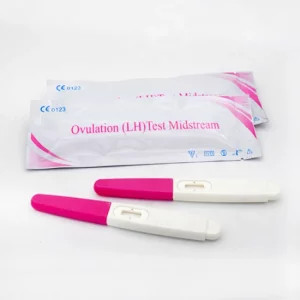
Understanding the timeline of pregnancyPregnancy is an incredible journey that begins with the fertilization of an egg by sperm during intercourse. However, detecting a pregnancy may take some time. Understanding the pregnancy timeline and knowing when it can be detected after intercourse is essential for those trying to conceive or concerned about an unintended pregnancy. This article explores the various factors influencing pregnancy detection, highlights the earliest signs of pregnancy, explains the accuracy of pregnancy tests, and clarifies when pregnancy can be detected after intercourse.
How pregnancy is detected
Before exploring the timeline, it is important to understand how pregnancy is detected. When a sperm fertilizes an egg, the fertilized egg implants itself into the lining of the uterus. This process triggers the release of a hormone called human chorionic gonadotropin (hCG) into the woman’s bloodstream. The presence of hCG is a key indicator of pregnancy and is what pregnancy tests detect.
Factors affecting the detection of pregnancy after intercourse
Several factors can influence the detection of pregnancy after intercourse. One crucial factor is the timing of intercourse in relation to the woman’s menstrual cycle. A woman is most fertile during ovulation, which typically occurs around 14 days before the start of her next period. If intercourse takes place during this fertile window, the chances of pregnancy are higher, and it can be detected earlier.
Another important factor is the sensitivity of the pregnancy test. Different tests have varying sensitivity levels, meaning they can detect different amounts of hCG. Some tests can pick up even the smallest traces of hCG for earlier detection, while others require higher levels of the hormone before showing a result.
The earliest signs of pregnancy
While a pregnancy test is the most reliable way to confirm pregnancy, there are some early signs that may indicate the possibility of being pregnant.
These signs can vary from woman to woman and may include breast tenderness, fatigue, nausea, frequent urination, and a missed period. However, it’s important to note that these signs can also stem from other factors, such as hormonal changes or illness. Therefore, you shouldn’t rely on them solely for pregnancy confirmation.
Pregnancy tests and their accuracy
Pregnancy tests are designed to detect the presence of hCG in a woman’s urine or blood. These tests are highly accurate when used correctly and at the appropriate time. However, it is important to follow the instructions provided with the test and wait for the recommended time period before interpreting the results.
Most home pregnancy tests claim to provide accurate results as early as the first day of a missed period. However, it is important to note that the accuracy of these tests can vary depending on factors such as the sensitivity of the test and the concentration of hCG in the woman’s body.
When can pregnancy be detected after intercourse?
The timing of detecting pregnancy after intercourse depends on several factors. Typically, the fertilized egg implants in the uterus within 6-12 days, and the body starts producing detectable levels of hCG. For accurate results, it’s best to take a pregnancy test at least a week after missing your period.
However, some highly sensitive pregnancy tests claim to be able to detect pregnancy as early as 6-8 days after conception. These tests can detect even the smallest amounts of hCG, allowing for early detection before a missed period.
The role of hormones in pregnancy detection
The detection of pregnancy relies on the presence of the hormone hCG. After fertilization, hCG levels increase rapidly, doubling every 48-72 hours. This hormone is crucial for maintaining the pregnancy and supporting the development of the embryo. By detecting hCG in a woman’s urine or blood, pregnancy tests can provide an indication of whether or not she is pregnant.
False-negative and false-positive pregnancy test results
While pregnancy tests are highly accurate, there is still a possibility of false-negative or false-positive results. A false-negative result occurs when a woman is pregnant, but the test fails to detect it. This can occur if the test is taken too early or if the woman’s body has a low concentration of hCG.
On the other hand, a false-positive result occurs when a woman is not pregnant, but the test indicates otherwise. This can happen due to certain medications, medical conditions, or even an expired or faulty pregnancy test.
Seeking medical advice for pregnancy confirmation
If a home pregnancy test indicates a positive result, it is recommended to seek medical advice for confirmation. A healthcare professional can conduct a blood test to measure the levels of hCG in the body, providing a more accurate result. They can also provide guidance and support throughout the pregnancy journey.
Conclusion
Understanding the timeline of pregnancy and when you can detect it after intercourse is essential for anyone planning to conceive or concerned about a potential pregnancy.
While pregnancy tests can provide accurate results, it is important to consider factors such as timing, test sensitivity, and the possibility of false results. Seeking medical advice for confirmation is always recommended. Remember, every pregnancy journey is unique, and it is important to consult with healthcare professionals for personalized guidance and support.